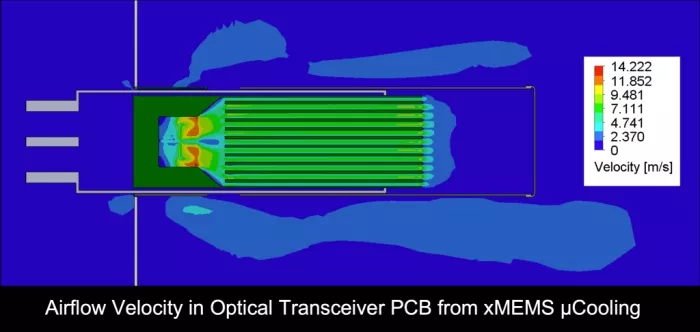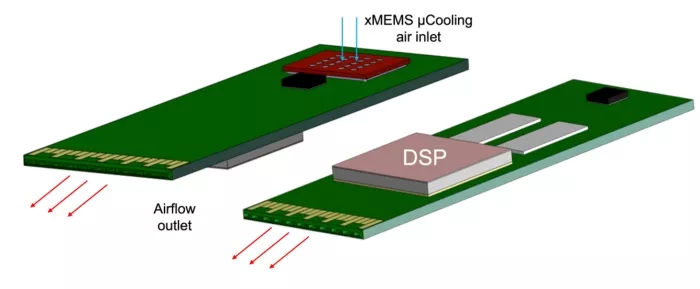xMEMS Extends µCooling Fan-on-a-Chip Technology to AI Data Centers
Santa Clara, California, April 29, 2025 – xMEMS Labs, Inc., the pioneer of monolithic MEMS-based solutions, today announced the expansion of its revolutionary µCooling fan-on-a-chip platform into AI data centers, bringing the industry’s first in-module active thermal management solution to high-performance optical transceivers.
Originally developed for compact mobile devices, xMEMS µCooling now provides targeted, hyper-localized active cooling for dense, thermally-challenged environments inside 400G, 800G, and 1.6T optical transceivers — a critical yet underserved category in next-gen AI infrastructure.
Unlike conventional cooling approaches that target high-power (kilowatt) processors and GPUs, µCooling focuses on smaller, thermally stressed components that large-scale cooling systems can’t reach, such as optical transceiver DSPs, that operate at 18W TDP or higher. These components introduce thermal challenges and increasingly limit transceiver performance and reliability as data rates scale.
xMEMS’ monolithic MEMS fan, fabricated in standard silicon processes, pumps a continuous stream of silent, vibration-free high velocity air pulses and is the only active cooling solution small and thin enough to be embedded inside the transceiver module. Thermal modeling shows that µCooling can remove up to 5W of localized heat, reducing DSP operating temperatures by over 15% and thermal resistance by more than 20%, enabling higher sustained throughput, improved signal integrity, and extended module lifetimes.

A key innovation in µCooling’s system design is its implementation in a dedicated, isolated airflow channel that is thermally coupled to the transceiver’s internal heat sources but physically separated from the optical path and core electronics. This architecture ensures that optical components remain protected from dust or contamination, preserving signal clarity and transceiver reliability while still delivering impactful cooling performance.

“As data center interconnect demands scale rapidly with AI workloads, thermal bottlenecks are emerging at the component level — especially in optical modules that are sealed, power-dense, and space-constrained,” said Mike Housholder, VP of Marketing at xMEMS Labs. “µCooling is uniquely positioned to solve this by providing true in-module active cooling with no compromise to optics or form factor.”
Market analysts forecast strong growth in high-speed optical connectivity, with Dell’Oro Group projecting 800G and 1.6T transceiver shipments to grow at over 35% CAGR through 2028. As these modules scale in performance and power, cooling challenges are becoming a critical barrier to adoption.
µCooling’s solid-state, piezoMEMS design means no motors, no moving bearings, and no mechanical wear, enabling maintenance-free reliability and high-volume manufacturability. Its compact footprint, as small as 9.3 x 7.6 x 1.13mm, and scalable architecture make it ideal for modular deployments across a wide range of interconnects, including QSFP-DD, OSFP, and future pluggable and co-packaged optics.
With µCooling now serving both mobile and data center markets, xMEMS is delivering on its vision of scalable, solid-state thermal innovation to unlock the next wave of high-performance electronics.
About xMEMS Labs, Inc.
Founded in January 2018, xMEMS Labs is the “X” factor in MEMS with the world’s most innovative piezoMEMS platform. It invented the world’s first solid-state, monolithic MEMS speakers that combine the scalability of semiconductor manufacturing with revolutionary audio performance, enabling new audio experiences in wireless earbuds, wearables, hearing health, and now, AI glasses. The xMEMS piezoMEMS platform has also been extended to produce the world’s first μCooling fan on a chip delivering active thermal management in smartphones and other thin, performance-oriented devices.
xMEMS has over 230 granted patents worldwide for its technology. For more information, visit https://xmems.com.
Related Semiconductor IP
- JESD204E Controller IP
- eUSB2V2.0 Controller + PHY IP
- I/O Library with LVDS in SkyWater 90nm
- 50G PON LDPC Encoder/Decoder
- UALink Controller
Related News
- xMEMS Extends µCooling Fan-on-a-Chip to SSDs — Delivering First In-Drive Active Cooling for AI Data Centers and Laptop PCs
- Audio Pioneer xMEMS Announces General Availability of the World's Only All-Silicon, Solid-State Fidelity Micro Speakers
- xMEMS Labs Powers World’s First AI Sports Glasses with Cowell MEMS Tweeter
- xMEMS Raises $21M Series D to Accelerate Commercial Scale of Breakthrough piezoMEMS Technologies for AI-Enabled Consumer Devices
Latest News
- PQSecure Collaborates with George Mason University on NIST Lightweight Cryptography Hardware Research
- Omni Design Technologies Advances 200G-Class Co-Packaged Optics IP Portfolio for Next-Generation AI Infrastructure
- Global Annual Semiconductor Sales Increase 25.6% to $791.7 Billion in 2025
- Fabless Startup Aheesa Tapes Out First Indian RISC-V Network SoC
- SmartDV and Mirabilis Design Announce Strategic Collaboration for System-Level Modeling of SmartDV IP